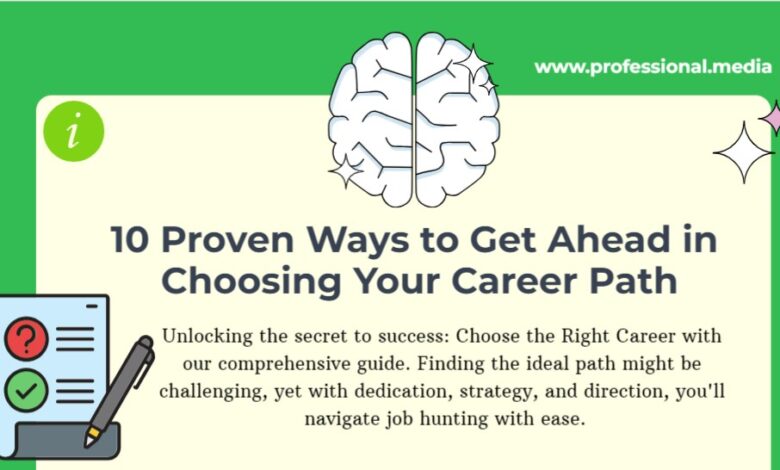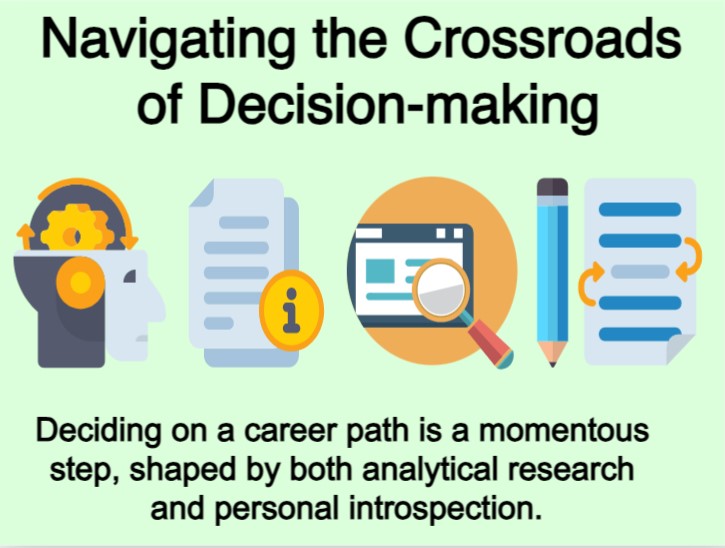
“How to Choose a Career” is a question that underscores the heart of one’s professional journey. For many, the decision of a career path becomes a crucial instrument in realizing their dreams. Whether the aim is to expand their realm of knowledge and skills, climb the hierarchical rungs of responsibility, or achieve a rewarding salary, it’s essential to grasp the true nature of a career. It goes beyond mere job roles and delves deep into personal development, transformation, and chasing one’s true goals.
Table of Contents
Choosing the right career can often feel overwhelming. With countless professions to consider, each with its own set of pros and cons, how does one navigate this intricate maze? Fear not, for we’ve distilled the process into 10 actionable steps to guide you to your ideal career path. Guide: Work from Home Jobs Opportunities: Thriving in Today’s Job Market
1. Through Self-Reflection
Understanding what drives you and what matters most can pave the way to a fulfilling career. It’s not necessarily about chasing a dreamy passion; it’s about aligning your profession with your interests and values. Delve into the questions below, exploring your interests, values, and personal characteristics:
Interest-Driven Questions:
- What subjects or topics capture your curiosity?
- How do you prefer to spend your leisure time?
- Are you inclined more towards physical tasks or intellectual challenges?
- Do you thrive in an outdoor environment or an indoor setting?
Questions Rooted in Values:
- What holds the highest significance in your life?
- How do you rank life’s priorities?
- Where do you derive purpose and meaning?
- Is there a societal change or cause you’re passionate about driving?
Questions Centered on Personal Traits:
- How do you define personal success?
- What do you yearn for more in life?
- Of all your strengths, which brings you the most joy?
- Which skill or talent fills you with pride?
Final Thoughts: When figuring out how to choose a career, taking time for introspective questioning can lead you to a profession in harmony with your authentic self. This process emphasizes aligning your job choices with your inherent inclinations and deeply-held values. 5 High-Paying College Student Jobs for Financial Freedom
2. Dive into Diverse Sectors
- Research the different career sectors available. Take note of which ones you find interesting and explore these further. Consider where your current skills, interests and passions may fit into these areas.
- Make a list of the top 5 career sectors that you feel could be a good fit for you and research these in more detail. Talk to people who are already working in those industries and ask questions about their experience, what they would recommend, etc.
- Consider how each sector is growing or changing due to technological advances or other factors. Think through which industry might offer the most opportunity for advancement or learning new skills and staying relevant in the future work environment.
- Look into various organizations that are hiring in each sector – investigate their mission statements, values, and culture to make sure it aligns with your own goals and values as well as what is important to you on a personal level.
- Evaluate yourself objectively by taking an aptitude test or talking with a career counselor to gain insight into your potential strengths and weaknesses when it comes to choosing a career in one of these sectors.
- Take action – create a job search strategy specific to the sector that you have chosen, reach out to contacts who may be able to help connect you with hiring managers or recruiters, polish up your resume / cover letter / online presence so they are all tailored for this industry, attend industry events, etc..
Exploring Different Sectors: Understanding each sector’s core objectives can guide your decision on where you might excel. Reflect on which sector’s goals align with your interests. Resume Guide: Unlock Your Essay Writing Potential!
Private Sector:
- Overview: Employment comes via privately-held firms or corporations, with a primary focus on bolstering growth and revenue.
- Key Advantage: Enhanced opportunities for growth.
Public Sector:
- Overview: Employment is anchored in local, state, or federal governments, ensuring the continuity of public initiatives and institutions.
- Key Advantage: Increased job stability.
Non-Profit Sector:
- Overview: Employment is within organizations distinct from the private or public sectors. These entities address public demands or needs. Although revenue generation isn’t the primary objective as it is for private businesses, they need to garner enough to sustain their mission and operations.
- Key Advantage: Amplified sense of purpose and impact.
3. Delving into Your Motivations
Discover the key to career satisfaction in How to Choose a Career. Evaluating Your Motivations and Priorities. Dive deep into introspection, align passions with profession, and ensure a fulfilling career journey. Find clarity in your career aspirations.
When navigating how to choose a career, after understanding yourself, it’s crucial to recognize your reasons for wanting to work. Are you driven by the allure of a higher initial salary, or perhaps the freedom to work remotely from any corner of the globe? Each profession comes with its unique offerings, and seldom will one tick all your boxes. Therefore, knowing what ranks highest on your priority list is essential.
Crafting a Comprehensive Priorities Checklist: While everyone’s list may differ slightly based on personal values and aspirations, we’ve crafted a sample list to spark your introspection. Reflect upon the elements below, considering their importance to you and rearranging them based on your preferences:
- Salary: The financial compensation you’ll receive.
- Benefits: Additional perks like health insurance, retirement plans, and bonuses.
- Autonomy: The degree of control and independence in your role.
- Work/Life Balance: Ensuring both your professional and personal lives receive equal focus.
- Flexibility: The ability to adjust working hours or work from diverse locations.
- Career Growth: Opportunities for professional development and upward mobility.
- Impact on Society: The change or influence your role can have on the larger community.
- Work Environment: The type of setting, whether it’s a bustling office or a quiet remote space.
When determining how to choose a career, this list can act as a guiding compass, ensuring you align your choices with what truly matters to you.
4. How to Choose a Career. Venturing into Various Industries
Broadening Your Horizon with Industries: When determining how to choose a career, diving into a diverse range of industries is as pivotal as evaluating sectors. By meticulously researching, you can pinpoint industries that not only pique your interest but also align with your skills and aspirations. For instance, in the US, dominant industries encompass areas like energy, consumer goods, and media and entertainment. However, it’s worth noting that the global landscape is replete with emerging industries, including green technology, digital health, and e-commerce, to name a few.
Crafting an Informed Approach: Begin by cataloging industries that catch your attention. Delve deeper by investigating the predominant roles in these industries, potential career paths, anticipated market dynamics, and growth prospects. Moreover, consider the work culture, technological advancements, and the societal impact each industry may offer.
Understanding the nuances of each industry not only gives you clarity but also empowers you with the knowledge to make informed decisions. By doing this groundwork, you’ll be better equipped to navigate the labyrinth of choices and decisively pinpoint a career path that resonates with your professional vision.

5. Using Self-Assessments to Enhance Career Choices
Self-assessment: Know Thyself Before diving into any career, it’s vital to understand yourself. What are your strengths, weaknesses, passions, and dislikes? Tools like the Myers-Briggs Type Indicator or the Strong Interest Inventory can provide insights.
The Power of Self-Assessment: In the journey of understanding how to choose a career, self-assessment tests emerge as powerful tools that offer invaluable insights. These tests are meticulously designed to evaluate a wide spectrum of attributes, from your inherent personality traits and strengths to your optimal work environment and potential career matches. Across the globe, many individuals and career counselors employ these tests as a starting point for discerning career paths.
Interpreting Test Results with a Pinch of Salt: However, it’s essential to approach these tests with a balanced perspective. While they offer structured outcomes based on your responses, they can sometimes be overly rigid, attempting to pigeonhole you into predefined categories. Every individual is multifaceted, and no test can encapsulate the entirety of one’s aspirations, motivations, and potential.
Incorporating Insights into Your Career Blueprint: Rather than treating these tests as the ultimate guide, use them as a supplementary resource. They can provide a fresh angle, revealing aspects of your personality or preferences you might not have considered. If certain results resonate with you, integrate that understanding into your broader career exploration process. Conversely, if some outcomes feel misaligned, trust your intuition and reflect on why that might be the case.
In essence, while charting the course of how to choose a career, remember that self-assessment tests are just one of many tools at your disposal. Your journey is unique, and while these tests provide direction, your personal insights, experiences, and aspirations will always be the most significant guiding lights.
6. Crafting Your Future: Mapping Long-Term Goals for Career Success
Visualizing Your Ideal Future: When considering how to strategize your career path, reflecting on your long-term aspirations is imperative. Envision the most fulfilling version of your life. What does it entail? By articulating both your personal and professional goals, you can craft a clearer roadmap of the steps and choices necessary to achieve them. Perhaps you see yourself spearheading a multinational firm from the C-suite, owning a serene countryside home, or traveling the world, soaking in diverse cultures.
Tailoring Your Job Search with Precision: Your comprehensive list of goals becomes an invaluable asset when you embark on your job hunt. It not only illuminates the roles and industries that align with your aspirations but also enables you to filter out those that don’t. For instance, if you’re passionate about sustaining a position in a particular industry for the long haul, it’s beneficial to investigate its future prospects. Which sectors are projected to thrive, and which might wane due to technological disruptions, evolving consumer behaviors, or global economic shifts?
Staying Ahead of the Curve: In this rapidly changing world, staying informed about emerging trends, technological advancements, and industry forecasts can be a game-changer. It ensures that you’re not only prepared but also ahead of the curve. By aligning your goals with industries poised for growth, you optimize your chances for success, stability, and fulfillment.
Ultimately, while short-term wins can be gratifying, a career built on thoughtful, long-term planning will likely yield more sustained satisfaction and success.
7. Define Your Values
Your values will guide you in your professional life. Are you looking for financial stability? Or is making a difference in society more critical for you? Knowing what you value helps in aligning your job with your life goals.
The Significance of Values in Career Selection: When embarking on the journey of how to choose a career, introspecting on your core values emerges as an indispensable step. These values, whether they revolve around financial prosperity, societal impact, work-life harmony, or personal growth, play a pivotal role in shaping your professional trajectory. They act as your compass, ensuring that your chosen path not only fulfills your materialistic needs but also resonates with your soul.
Financial Stability vs. Societal Impact: While financial security is a valid aspiration, driving many to seek lucrative industries or roles, it’s essential to balance it with inner fulfillment. For some, making tangible differences in the lives of others or contributing to societal advancements might hold more weight than a hefty paycheck. Determining where you lie on this spectrum is key to long-term job satisfaction.
Harmonizing Career Choices with Life Aspirations: By crystalizing what you genuinely value, you can seamlessly integrate your career with your overarching life vision. If work-life balance is a priority, perhaps roles with flexibility or remote working options would be appealing. If continuous learning fuels your passion, industries that evolve rapidly, like technology or healthcare, might be worth exploring.
Crafting a Future with Intention: The world of work is vast, offering a myriad of opportunities. But to navigate it effectively and find a niche where your heart and skills align, it’s vital to have a clear understanding of your values. By doing so, not only do you set yourself up for professional success, but you also ensure that this success is intertwined with personal contentment and purpose. Remember, a career chosen with intention and alignment with your values is more likely to stand the test of time and bring lasting fulfillment.
8. Prioritizing Continuous Learning for Lasting Success
In the modern, ever-evolving job sphere, the need for continuous learning is paramount. When considering how to choose a career, it’s vital to recognize the significance of persistent skill enhancement. Seize every opportunity for professional growth, be it by participating in industry-focused workshops, attaining sought-after certifications, or delving into comprehensive online courses. By broadening your expertise and capabilities, you not only bolster your appeal to potential employers but also pave the way for sustained career advancement.
The Ever-Evolving Career Landscape: In the rapidly shifting terrain of today’s professional world, the adage ‘knowledge is power’ has never been more pertinent. When deliberating on how to choose a career, it’s crucial to recognize that static skills might soon become obsolete. To stay relevant, adaptive, and competitive, one must immerse themselves in the culture of ceaseless learning.
Unlocking Doors with Professional Development: Opportunities for growth and development abound. It could be an industry-specific workshop that not only enhances your skills but also expands your professional network. Perhaps it’s a certification that distinguishes you from the crowd, or even an online course that lets you explore emerging trends at your own pace. By ardently pursuing these avenues, you don’t just embellish your resume; you evolve into a more versatile, informed, and marketable professional.
Beyond Traditional Education – The Digital Era Advantage: With the digital revolution, the barriers to education have diminished. Platforms like Coursera, Udemy, and LinkedIn Learning have democratized access to world-class courses, allowing individuals to tailor their educational journey to their career aspirations. Whether it’s AI, sustainable practices, leadership, or any other domain, the resources are at your fingertips.
A Proactive Approach to Career Longevity: It’s not just about securing a job; it’s about carving a career trajectory that’s resilient to industry upheavals and economic downturns. By fostering a mindset of continuous learning, you not only adapt to the demands of your current role but also prepare for future challenges and opportunities. Remember, in the grand chessboard of professional life, those who anticipate changes and equip themselves accordingly often emerge as the game-changers.
9. The Power of Networking and Building Professional Relationships
In the realm of career decisions, the importance of cultivating a robust network cannot be understated. When pondering how to choose a career, consider the role of interpersonal connections. Proactively engage with peers, mentors, and trailblazers in your industry. Make it a point to participate in conferences, become a member of professional associations, and immerse yourself in networking gatherings. This ever-growing web of connections can be a treasure trove of advice, mentorship, and invaluable job referrals as you navigate your career path.
In the intricate tapestry of career choices, the threads of networking and relationships weave a foundational pattern. When deliberating on how to choose a career, it’s crucial to understand the profound impact of personal and professional connections. Engage actively and deliberately with colleagues, seasoned mentors, and luminaries within your desired field. Dedicate time to attending industry-specific conferences, enrolling in specialized workshops, and seeking out membership in renowned professional guilds or associations.
Beyond formal events, consider the less obvious but equally potent opportunities to network: alumni events, online forums, and even informal meet-ups or coffee catch-ups with industry insiders. These interactions not only broaden your perspective but can also lead to collaborative ventures, insightful feedback on your aspirations, and a pulse on industry trends.
As your network flourishes, it becomes a rich reservoir of knowledge, shared experiences, and potential career opportunities. Remember, in many industries, openings are often filled through referrals even before they’re advertised. A robust, well-maintained network could very well be your ticket to that dream role, offering guidance and support every step of the way.
10. Prioritizing Adaptability in Today’s Fluid Job Market
The Importance of Embracing Adaptability. In the contemporary work ecosystem, adaptability emerges as a cornerstone skill. As you ponder how to choose a career, it’s essential to value flexibility and resilience. Be receptive to novel concepts, demonstrate agility in your strategies, and be an avid learner from both successes and setbacks. By championing adaptability, you’re not only preparing to tackle unforeseen challenges but also positioning yourself to capitalize on emergent opportunities in a constantly shifting professional world.
In our modern professional landscape, the pace of change is relentless. Evolving technologies, shifting market dynamics, and the constant demand for innovation make adaptability a crucial trait. When contemplating how to choose a career, it’s imperative to recognize the weight adaptability carries. This involves more than just being open to new ideas; it’s about cultivating an intrinsic resilience to change, mastering the ability to pivot when circumstances demand, and being proactive in upskilling to stay relevant.
Furthermore, as industries evolve, job roles that exist today might be radically transformed or become obsolete tomorrow. Here, adaptability becomes the bridge to transition seamlessly across such changes. Whether you’re starting out or are a seasoned professional, always seek opportunities that challenge you, broaden your horizons, and take you out of your comfort zone.
Additionally, in a world filled with uncertainty, an adaptable mindset can serve as your compass, guiding you through uncharted territories, enabling you to spot emerging trends, and ensuring you’re always in a prime position to seize new opportunities. In essence, adaptability is not just a skill but a mindset, a way of life that promises sustainability and growth in an unpredictable professional sphere.
11. Prioritize Work-Life Balance
Establishing a healthy work-life balance is vital for overall well-being and sustained success. Set boundaries between work and personal life, and make time for activities that recharge and rejuvenate you. By prioritizing self-care and maintaining a healthy balance, you can enhance your productivity, creativity, and satisfaction in both professional and personal realms.
In the journey of determining how to choose a career, it’s crucial not to overlook the significance of work-life harmony. A balanced approach to professional and personal pursuits isn’t just a luxury—it’s an essential factor that can deeply influence job satisfaction, mental well-being, and overall life quality.
Today’s work culture, with its emphasis on constant connectivity and relentless productivity, often blurs the lines between professional commitments and personal time. However, when choosing a career, it’s beneficial to seek roles and industries that respect and promote this equilibrium. A role that offers flexibility, understanding, and respect for personal time can lead to a more fulfilled and less stressed life.
Remember, consistently sacrificing personal time for work can lead to burnout, reduced creativity, and waning enthusiasm. On the other hand, allowing yourself periods of rest, engaging in hobbies, spending time with loved ones, and pursuing personal growth can greatly enhance your work performance.
When considering how to choose a career, factor in the potential for achieving a balanced lifestyle. It’s not merely about clocking hours at a desk but ensuring those hours contribute to a holistic life where professional achievements and personal joy coexist harmoniously. By giving weightage to work-life balance in your career decisions, you set the stage for long-term happiness and success.
12. Seek Career Counseling
How to Choose a Career? Leveraging Career Counseling Expertise. When determining the ideal career path, professionals in career counseling become an indispensable resource. With a wealth of tools and specialized knowledge at their disposal, they offer clarity and direction in the complex journey of career selection. By tapping into their guidance, you not only gain insights tailored to your strengths and aspirations but also save precious time and avoid potential pitfalls.
The Role of Career Counseling in Shaping Your Path. When navigating the vast landscape of potential careers, seeking the expertise of career counseling professionals can be a game-changer. These experts are well-versed in using specialized tools and resources tailored to help individuals gain a clearer understanding of their professional inclinations. Beyond mere job suggestions, career counselors consider your unique strengths, passions, and lifestyle to offer holistic advice.
They can help you identify industries that resonate with your personal values and guide you toward roles that match your skills and aspirations. Moreover, their insights can spare you from potential pitfalls, ensuring that your journey towards your dream job is more streamlined and informed. In a world brimming with possibilities, career counseling can be the compass you need to confidently choose the career best suited for you.
13. Research Various Professions
Dive deep into understanding what each profession entails. Websites like the Bureau of Labor Statistics can provide details about job descriptions, salary expectations, and future prospects.
The Crucial Role of Internships in Career Exploration. In the vast landscape of career decision-making, gaining firsthand experience through internships emerges as a strategic move. Rather than basing decisions on perceptions or assumptions, diving into an internship or a part-time position within your target field offers tangible insights. It enables you to grasp the day-to-day intricacies, understand the work culture, and interact with industry professionals.
This hands-on experience can validate your inclinations or even redirect your career trajectory based on your actual experiences. Beyond just the tasks, internships can also illuminate potential growth paths, mentorship opportunities, and even the challenges one might face. As you navigate the process of how to choose a career, such immersive experiences act as powerful compasses, ensuring your choices are well-informed and aligned with both your skills and passions.
14. Experience Firsthand with Internships
There’s no better way to understand a job than by doing it. Internships or part-time jobs in your desired field can give you a real sense of whether it’s the right fit.
Gaining Insight Through Internships and Part-Time Roles. When charting a course for your professional future, practical experience stands as a beacon of clarity. The mantra, ‘learning by doing’, holds profound truth when considering how to choose a career. Internships and part-time jobs in sectors you’re curious about offer a real-time lens into the realities of the job.
More than just a line on a resume, these roles provide a platform to test your aptitude, interests, and resilience in a particular field. You’ll interact with seasoned professionals, understand workplace dynamics, and confront challenges that can either affirm your direction or suggest a need to pivot.
Furthermore, such experiences often open doors to mentorship, networking, and deeper insights into industry trends. As you stand at the crossroads of career decisions, let hands-on experiences guide your steps, ensuring your path aligns with both your aspirations and genuine interests.”
15. Evaluate the Job Market
While passion is essential, so is practicality. Consider the demand for certain professions in your location. Some careers might be in high demand, leading to better job security and higher pay.
How to Choose a Career: The Indispensable Role of Internships and Part-Time Jobs. As you navigate the multifaceted journey of how to choose a career, immersing yourself directly in potential roles stands out as a key strategy.
The saying ‘experience is the best teacher’ rings particularly true in the professional realm. By engaging in internships or securing part-time positions within industries of interest, you not only gain a tactile understanding of the job but also a genuine feel for the culture, expectations, and daily dynamics. These first-hand experiences provide a unique window into the nuances of a career, allowing you to assess alignment with your personal strengths, values, and ambitions.
Moreover, such roles often pave the way for mentorship opportunities, expanded networks, and a clearer perspective on the growth trajectories within that field. So, as you embark on the quest of determining your ideal career path, let tangible experiences be your compass, guiding you to a profession that truly resonates with your essence.
15. The Role of Further Education and Training
In the ever-evolving professional landscape, one aspect remains consistent: the importance of education and training. When plotting the course of your career, understanding the qualifications and certifications necessary for your desired role is imperative. So, how does further education play into how to choose a career?
1. Mapping Out Your Career Path:
Before you jump headfirst into any profession, it’s crucial to understand the roadmap that leads to it. Does the job you’re eyeing require a specific degree, or perhaps a particular certification? Researching these prerequisites will provide clarity on the steps you need to take.
2. The Investment in Education:
Further education often comes with two primary investments: time and money. Be it a two-year associate degree, a four-year bachelor’s degree, or specialized certifications, each demands dedication and commitment. When considering to choose a career, evaluate whether you’re prepared to make these investments. Remember, these are stepping stones that could lead to long-term career satisfaction and success.
3. Quality of Training Institutions:
Not all training programs or institutions are created equal. It’s essential to select reputable schools or organizations that are recognized in your desired industry. Look for accreditation, faculty qualifications, and reviews from former students.
4. Networking Opportunities:
Educational institutions often provide more than just academic knowledge. They can be gateways to networking events, internships, and job placements. Many schools have partnerships with companies and industry professionals, which can be a tremendous asset as you transition from student to professional.
5. Flexibility in Learning:
Today’s digital age offers myriad ways to acquire further education. From night classes for working professionals to online courses that can be taken from anywhere in the world, there are various formats to suit your lifestyle and commitments.
6. The Evolution of Industries:
With the rapid advancement of technology and the ever-shifting global economy, industries evolve. As a result, certain skills and qualifications that were once optional might become mandatory. Continuous learning keeps you relevant and competitive.
In Conclusion, to Choose a Career Ways. Choosing a career is a monumental decision, one that can shape the trajectory of your life. While passion, interest, and innate skills are pivotal, understanding the educational and training requirements of a profession is equally vital. It’s an investment in your future, potentially paving the way for not just a job, but a fulfilling career. Embrace education, hone your skills, and step confidently onto your chosen career path.

16. Navigating the Crossroads of Decision-making
Embarking on the journey of choosing a career path can often feel like navigating through a maze with multiple turns and decisions at every corner. After delving into thorough research, investing time in introspection, and gaining firsthand experience, you’ll eventually reach a significant juncture: the moment of decision-making.
1. Trust Your Research:
You’ve invested time in understanding the intricacies of various professions, their demands, and their prospects. This groundwork will be instrumental in guiding your decisions, ensuring they are well-informed and aligned with your goals.
2. Tune into Your Feelings:
Beyond facts and figures, consider how you feel about the potential career paths you’ve explored. Does a particular option excite you? Can you visualize yourself in that role for years to come?
3. Flexibility is Key:
When pondering how to choose a career, always remember that the professional world is dynamic. Industries evolve, roles transform, and personal preferences shift. While your decision carries weight, it’s not set in stone. Being open to change and adaptable is paramount.
4. Seek External Input:
Engage mentors, career counselors, or trusted peers in your decision-making process. Sometimes, an external perspective can provide clarity and introduce considerations you might have overlooked.
5. Consider the Broader Life Impact:
Your chosen career will influence many aspects of your life – from your daily routine and work-life balance to potential relocation or travel requirements. Weigh these factors in your decision-making process.
6. The Journey Continues:
Lastly, remember that choosing a career is just one milestone in your professional journey. Opportunities for growth, learning, and redirection will present themselves along the way.
In Conclusion: Deciding on a career path is a momentous step, shaped by both analytical research and personal introspection. As you stand at this crossroads, remember that with every choice, there’s an opportunity for growth and evolution. Embrace the journey, knowing that as you evolve, so too can your career.
17. Navigating the Pivotal Decision-Making Moment
Embarking on the journey of career selection is a process rife with research, deep introspection, and real-world experiences. As the culmination of all your efforts draws near, you’re faced with the decisive moment: selecting your career path.
1. The Significance of Choice:
Though the weight of this decision can feel monumental, it’s pivotal to remember that every choice is but a chapter in the evolving narrative of your professional life.
2. The Dynamic Nature of Careers:
In our rapidly changing global landscape, careers are no longer static. Industries transform, new roles emerge, and personal growth can lead to evolving professional aspirations.
3. Harnessing Your Insights:
Reflect on the wealth of knowledge you’ve gathered. Which professions resonate deeply with you? Which align with your personal values, skills, and long-term objectives?
4. Embracing Flexibility:
Understanding how to choose a career also involves recognizing the fluidity of decisions. As you evolve—gaining new experiences and insights—your career trajectory can adapt, mirroring your personal growth.
5. Seek Reinforcement and Advice:
Engaging with peers, mentors, or career counselors can offer additional perspectives. Their guidance can either solidify your current inclinations or introduce considerations you hadn’t previously pondered.
6. Looking Ahead with Optimism:
Whatever decision you make now, the horizon is abundant with opportunities for reassessment, growth, and potential redirection. Every experience, whether it meets your initial expectations or offers unexpected lessons, enriches your professional tapestry.
18. How to Choose a Career: Concluding Insights on Your Professional Journey
In the vast expanse of one’s professional life, the pivotal moment of selecting a career path holds undeniable significance. But as you stand on the cusp of this decision, it’s essential to view it with perspective.
1. Beyond the Moment:
While the current choice feels monumental, it’s merely a chapter in the evolving narrative of your career. The world of work is fluid, and new opportunities can emerge at any juncture.
2. The Power of Preparation:
The foundation of a wise career decision rests on diligent research, self-awareness, and deep introspection. These elements empower you to align your career choice with your innate strengths, passions, and long-term objectives.
3. Adapting with Time:
Understanding how to choose a career involves acknowledging that professional aspirations can transform. As you encounter new experiences, learn novel skills, and undergo personal growth, your career aspirations may evolve, prompting you to pivot or specialize further.
4. Trusting the Journey:
The beauty of a career lies not just in the destination but also in the journey. Each role, project, or challenge encountered provides learning experiences, refining your understanding of your ideal professional trajectory.
5. Embracing the Future with Confidence:
Armed with your insights and the inherent flexibility of the modern professional landscape, you’re poised to navigate your career journey adeptly, ensuring alignment with both your current aspirations and those that may unfold in the future.
In wrapping up, while the immediate task of deciding your career path is undeniably crucial, it’s equally vital to recognize its place within the broader continuum of your professional life. By staying informed, self-aware, and adaptable, you’re well-positioned to make choices that resonate with both your present circumstances and future potential.
19. Charting a Course with Clear Goals and Strategic Planning
In the journey of professional development, understanding how to choose a career is just the beginning. Once you’ve pinpointed your direction, the subsequent steps involve crafting a vision and setting a trajectory.
1. The Power of Vision:
Having a clear vision of where you want to be in the future is vital. It’s not just about the job title, but also the kind of work-life balance, the impact you wish to create, and the legacy you want to leave.
2. Breaking Down the Timeline:
Segment your professional journey into phases—short-term (1-3 years), mid-term (4-9 years), and long-term (10+ years). This structure helps in creating actionable steps while allowing room for flexibility and adjustments as you progress.
3. Crafting SMART Goals:
When setting your goals, ensure they are Specific, Measurable, Achievable, Relevant, and Time-bound. This methodology ensures that you’re not just dreaming, but also planning realistically.
4. Developing a Tactical Action Plan:
Each goal requires specific actions. Break down your goals into smaller tasks. For instance, if your goal is to become a manager in five years, what skills do you need to acquire? Which courses should you take? Who in your network can help?
5. Periodic Review and Adjustment:
The professional landscape is dynamic. It’s essential to periodically review your goals and action plan, adjusting to new information, industry shifts, or personal growth.
6. Staying Motivated and Resilient:
Every journey has its highs and lows. Keeping your vision in sight, celebrating small wins, and learning from setbacks will ensure you remain driven.
In conclusion, once you’ve deciphered how to choose a career, it’s equally crucial to strategize on how to excel in it. By setting clear goals and meticulously charting out your action plan, you set yourself on a path of continuous growth, achievement, and fulfillment in your chosen career.
In Conclusion Embarking on a journey to find your ideal career path can be daunting. However, with these ten essential steps, you’re equipped to make an informed, decisive choice. Always remember to stay true to yourself and keep evolving. The right career is not just about earning a paycheck; it’s about fulfilling your passions and living your best life.
Quiz: How to Choose a Career
This quiz on how to choose a career, aims to highlight the essential considerations and misconceptions in the career decision-making process. Understanding these aspects can better equip individuals in choosing careers that align with their passions, values, and long-term objectives.
1. Which of the following is NOT a good reason to choose a career?
a) It aligns with your passions and interests.
b) Friends and family pressured you into it.
c) The career has growth potential.
d) It aligns with your values and strengths.
2. Why is it beneficial to conduct informational interviews when considering a career?
a) To get a job offer immediately.
b) To understand the daily tasks associated with the job.
c) To impress the interviewee.
d) To get an inside scoop on company gossip.
3. Which factor should be considered while evaluating a potential career path?
a) The popularity of the job on social media.
b) The number of celebrities in that field.
c) The alignment with your long-term goals.
d) The color of the company’s logo.
4. What role do internships and part-time jobs play in the career selection process?
a) They allow you to take long breaks from studying.
b) They help you understand the practical aspects of a job.
c) They guarantee a full-time position after completion.
d) They are just for making some extra pocket money.
5. Why is networking considered valuable when deciding on a career?
a) It lets you brag about your accomplishments.
b) It provides insights into different industries and roles.
c) It guarantees a job in any company you desire.
d) It’s just a formal way to have parties.
6. Which of the following is a flexible approach to career planning?
a) Sticking to one path, regardless of personal satisfaction.
b) Never trying anything new or challenging.
c) Being open to evolving and changing career paths.
d) Ignoring all advice and feedback from mentors.
7. How can self-assessment tools or career aptitude tests help in choosing a career?
a) They give absolute answers about your perfect job.
b) They define your worth in the job market.
c) They provide insights based on your personality and interests.
d) They let you avoid making any decisions.
8. What is the importance of work-life balance in a career choice?
a) It’s not important; work should always come first.
b) It ensures you have time for personal pursuits and relaxation.
c) It’s only for people who don’t want to succeed.
d) It’s a myth; balance doesn’t exist.
Answers: 1. b, 2. b, 3. c, 4. b, 5. b, 6. c, 7. c, 8. b.
FAQ (Frequently Asked Questions)
-
1. Why is choosing a career so important?
Choosing a career is essential because it sets the direction for your professional journey. The right choice can lead to job satisfaction, financial stability, and personal growth, while a mismatch can result in job hopping, dissatisfaction, and unfulfilled potential.
-
2. Can I switch careers if I’ve already started on one path?
Absolutely! Many people change careers multiple times during their lives. While there might be challenges, such as acquiring new skills or starting at a different position level, it’s always possible with determination and the right resources.
-
3. How to choose a career that makes you happy
1. Identify your passions and interests: Consider what activities or subjects bring you joy and fulfillment. Reflect on your hobbies, skills, and things that you enjoy doing in your free time.
2. Assess your strengths and skills: Take stock of your strengths, talents, and skills. Consider the areas where you excel and feel confident. This can help guide you towards a career that aligns with your natural abilities.
3. Explore different career options: Research and explore various career paths that align with your passions and skills. Look for industries or professions that resonate with you and offer opportunities for growth and personal development.
4. Consider your values and priorities: Reflect on your values and what matters most to you in a career. Consider factors such as work-life balance, salary, flexibility, and values alignment with the company or industry.
5. Seek advice and guidance: Speak to professionals in fields that interest you. Conduct informational interviews or shadow professionals to gain insights into their day-to-day work. Seek advice from mentors, career counselors, or trusted individuals who can provide guidance based on their experiences.
6. Try internships or part-time work: Consider trying out internships, part-time jobs, or volunteering opportunities in fields that interest you. This hands-on experience can provide valuable insights and help you make an informed career decision.
7. Set realistic expectations: Keep in mind that finding a career that brings happiness is a journey. It may take time and experimentation to discover the right fit. Be open to learning and adapting along the way.
8. Trust your intuition: Ultimately, trust your instincts and listen to your inner voice when making career decisions. Choose a path that feels authentic and resonates with who you are as a person.
Remember, choosing a career that makes you happy is an ongoing process. It’s important to continuously reassess and make adjustments as your interests and priorities evolve over time.
-
How do I decide what career is right for me?
To decide on the right career, start by assessing your passions, strengths, and values. Consider career aptitude tests for insights aligned with your personality. Research potential fields, seek informational interviews, and perhaps try internships to gauge fit. Remember, satisfaction and alignment with long-term goals are paramount.
-
What are the 4 steps for choosing your career?
1. Self-assessment: Understand your interests, strengths, and values.
2. Research: Investigate industries and professions to determine growth and fit.
3. Experience: Engage in internships, job shadowing, or part-time jobs.
4. Decision-making: Evaluate options and choose a path aligned with your aspirations -
How do I choose a career I want to do everything?
When you’re passionate about many things, choosing a career can be challenging. Start by prioritizing interests and identifying overlapping skills. Seek careers with diverse roles or industries open to multifaceted talents. Consider careers in project management, consulting, or entrepreneurship where versatility is an asset. Always remain open to evolving.
What factors take precedence for job seekers selecting their ideal position? Delve into the criteria they consider and the corresponding percentages that highlight their significance in the decision-making process.
Salary: The financial compensation you’ll receive. - 9
Benefits: Additional perks like health insurance, retirement plans, and bonuses. - 9.5
Autonomy: The degree of control and independence in your role. - 9
Work/Life Balance: Ensuring both your professional and personal lives receive equal focus. - 9.4
Flexibility: The ability to adjust working hours or work from diverse locations. - 8.8
Career Growth: Opportunities for professional development and upward mobility. - 7.9
Impact on Society: The change or influence your role can have on the larger community. - 9.1
Work Environment: The type of setting, whether it’s a bustling office or a quiet remote space. - 9
9
Best Choice
We'd love to hear from you! Have you ever experienced the perfect hotel stay? Based on our discussion of the “ideal hotel choice,” how do your preferences and experiences match? Engage in conversation and share what you think is important to you in choosing a job. Every job seeker has a unique perspective. Yours could be the key to helping others learn how to find their dream job. Your voice matters; Share your criteria in the comments and give your rating right now!







